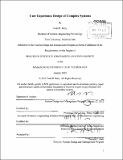User experience design of complex systems
Author(s)
Reily, Todd R. (Todd Richard)
DownloadFull printable version (11.30Mb)
Other Contributors
System Design and Management Program.
Advisor
Maria Yang and Michael Davies.
Terms of use
Metadata
Show full item recordAbstract
Over recent years, the global marketplace and its consumers have developed a mutual recognition for the rising prominence of design that delivers high quality user experience. For the provider of products and services, such design has emerged as a critical differentiator that creates new opportunities for revenue and drives customer loyalty. For the consumer, design can often surpass commoditized technical specifications as a basis for making purchase decisions. Nevertheless, despite their best intentions, many organizations still fail to successfully integrate design strategies into their existing processes and culture. This research examines the critical factors that enable successful implementation of design strategies under current market conditions in a way that produces sustained customer loyalty and revenue. Methods utilized in this research include one-on-one interviews, online surveys, and comparative case studies to ensure proper balance and perspective. The interviews were conducted with design leaders at organizations such as Philips and Frog Design. They covered the role that design plays at organizations, including the conditions necessary for successful design strategies and the barriers that they generally face. Surveys conducted for this research examined the personal experiences of 120 managers, engineers, and designers on the development of consumer-facing products, services, and systems. The result of these methods was a series of findings that supports the notion that a holistic "systems-based" approach offers competitive advantages to organizations looking to successfully implement a design-oriented strategy. It is this perspective that allows organizations to realize solutions that balance business objectives, technical capabilities, and design principles to meet customer intentions. It is proposed by this thesis that a systems-based approach has become necessary due to the ever-converging nature of today's networked products and services, particularly in the consumer marketplace. This thesis concludes with a framework of methods and principles for conceiving and designing user experiences for a complex market of convergent products and services. The framework borrows methods from Systems Thinking, Design Thinking, and User Experience Design to create a singular process that provides the clarity and simplicity necessary for a user experience amidst the complexity of a system design process.
Description
Thesis (S.M. in Engineering and Management)--Massachusetts Institute of Technology, Engineering Systems Division, System Design and Management Program, 2012. Cataloged from PDF version of thesis. Includes bibliographical references (p. 104-105).
Date issued
2012Department
System Design and Management Program.; Massachusetts Institute of Technology. Engineering Systems DivisionPublisher
Massachusetts Institute of Technology
Keywords
Engineering Systems Division., System Design and Management Program.